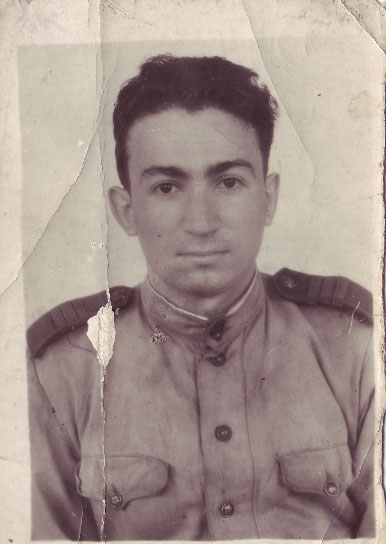Maksim Pikus was born in Baranowicze, Poland in 1924. He studied in a Hebrew school of the Tarbut network. When the Soviets annexed Baranowicze (it became part of Western Belorussia) in 1939, they closed the Tarbut school and Pikus was shifted to a Russian-language school. The pre-1939 border between the Soviet Union and Poland continued to be closed for all inhabitants of the western areas. However, Pikus's father Moisei, who came from the Minsk area, obtained a pass for himself and his children to visit his father (Maksim's grandfather) in Minsk. This circumstance, most probably, saved Maksim's life, because when the Soviet-German war started, he was able to evacuate eastward (his younger brother refused to go with him). Maksim reached Kazakhstan, in Central Asia, while the rest of the Pikus family was caught by the rapid German advance and perished.
In Kazakhstan, Maksim worked at a kolkhoz (collective farm). In August 1942, when he was 18, Maksim Pikus was drafted into the Red Army. However, as an "unreliable element" (originating from former Polish areas) he was sent to a labor battalion, rather than to a combat unit. In October 1942, after having realized that his family had perished, Pikus requested to serve at the front. However, he was sent there only in the fall of 1943, and his regiment was deployed against the Finnish army. Only after the war, Pikus did learn that the Finns had not persecuted Jews during the war, and that there had been even Jewish soldiers in the Finnish army. Thus, it turned out that his goal of taking revenge on the murderers of his family failed to be implemented.
Pikus was seriously wounded in 1944, during the fighting for Viipuri (Vyborg). He spent the following two years in military hospitals in terrible pain. In 1946, he settled in Daugavpils, Latvia, where he had some relatives; later he moved to Riga.
In 1989 Pikus made an attempt to move to Israel, but he abandoned this plan due to the marriage of his only daughter. After the disintegration of the Soviet Union in 1991, the Russian government stopped paying him a pension; however, he did receive a pension from Latvia (despite his lack of Latvian citizenship). Although distant relatives, who had settled in Germany during the 1990s, invited him to join them, Pikus refused their offer and stayed in Riga.







